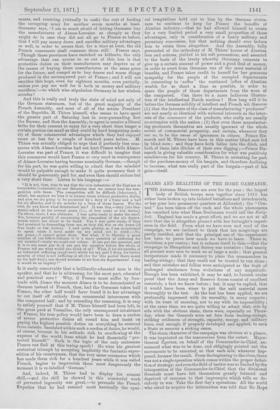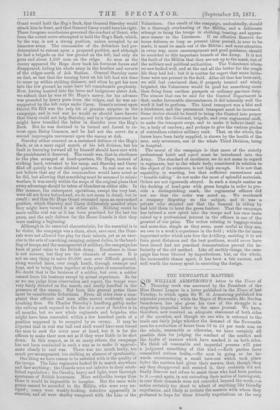SIIAMS AND REALITIES OF THE HOME CAMPAIGN.
THE Autumn Manoeuvres are over for the year ; the largest I body of British troops seen together since 1815 has either been broken up into isolated battalions and detachments, or has gone into permanent quarters at Aldershot ; the " Con- trol " has been taken off the rack, and the whole phenomena has vanished into what Hans Breitmann would call the Etvig- keit. England has made a great effort, and we are not at all sure that she is altogether pleased with her fortnight's experi- ence in tho field. From what we have seen and read of the campaign, we are inclined to think that her misgivings are partly justified, and that the principal use of the experiment has been to prove how much we have to learn. There is, doubtless, a per contra ; but it reduces itself to this,—that the campaign in Hampshire and Surrey was tentative ; that nearly all present were now to work on so large a scale ; that general inexperience made it necessary to place the commanders in leading-strings ; that they could not be trusted to run alone ; and that mistakes and follies were anticipated as the fruit of prolonged abstinence from evolutions of any magnitude. Enough has been exhibited, it may be said, to furnish ocular proof that the Army and Reserve forces consist of excellent materials, a fact we knew before ; but, it may be replied, that it would have been wiser to put the said material more thoroughly to the test. As the test has been applied, we are profoundly impressed with its unreality, in many respects ; with its want of meaning, not to say with its impossibility ; at the same time, we are quite willing to admit that, side by side with the obvious sham, there were, especially on Thurs- day, when the Generals were set free from leading-strings, striking evidences of strength, capacity, energy, and military force, real enough, if properly developed and applied, to save a State or succour a sinking cause.
The sham character of the campaign was obvious at a glance. It was imprinted on the manoeuvres from the outset. Major- General Egerton, on behalf of the Commander-in-Chief, an- nounced what was to be done, and obligingly pointed out the movements to be executed, so that each side, whatever hap- pened, foresaw the result. From thebeginning to the close,there was not a single operation which comes within the proper defini- tion of strategy; and even the field of tactics was so limited by the interposition of the Commander-in-Chief, that the divisional Generals must have felt themselves greatly fettered and deprived of recourse to that impromptu which tells so de- cisively in war. Take the first day's operations. All the world who cared to acquire the information was told that Sir Hope
Grant would hold the Hog's Back, that General Staveley would attack him in front, and that General Carey would turn his right. These foregone conclusions governed the conduct of Grant, who from the outset never attempted to hold the Hog's Back, which, by the way, is not a strong position, unless occupied by an immense army. The commander of the defenders had pre- determined to retreat upon a prepared position, and although he had a brigade on the low ground on the left, had only six guns and about 1,500 men on the ridge. As soon as the enemy appeared Sir Hope drew back his foremost forces and disappeared, hiding his whole army in the heather and coverts of the ridges north of Ash Station. General Staveley came on fast, so fast that the turning force on his left had not time to come up within striking distance, and when he got his men into the low ground he must have felt considerable perplexity. Now, having hurried into the lanes and hedgerows about Ash, we submit that he was at Sir Hope's mercy, for his advance was pounded by heavy guns from the ridges, and he was un- supported by the left corps under Carey. Grant's retreat upon Gravel Pit Hill was the only bit of genuine surprise in the campaign, and in real war he would or should have known that Carey could not help Staveley, and by a vigorous onset he might have trundled the latter in disorder over the Hog's Back. But ho was destined to be turned and forced to re- treat upon Bisley Common, and he had not the nerve for a second impromptu movement upon the enemy at Ash.
Staveley either counted on a sustained defence of the Hog's Back, or on a more rapid march of his loft division, but his fault in hurrying forward all by himself should have met with the punishment it deserved. The result was, that in obedience to the plan arranged at head-quarters, Sir Hope, instead of striking hard, retreated to his camp, and Staveley and Carey ffied off quietly to their allotted quarters. In real war we do not believe that any of the commanders would have acted as he did, but allowing that something must be assumed in mimic warfare, it was surely within the scope of the original plans that every advantage should be taken of blunders on either side. In like manner, the subsequent operations, except the very last, were all set down beforehand, we do not mean in detail, but in result ; and thus Sir Hope Grant retreated upon an entrenched position, which Staveley and Carey deliberately assailed when they might have turned it on either side. Nothing could be more unlike real war as it has been practised for the last ten years, and the only defence for the Horse Guards is that they were making a beginning.
Although in its essential characteristic, for the essential is to be victor, the campaign was a sham, since, save once, the Gene- rals were not allowed free play for their talents, yet as an exer- cise in the arts of marching, camping, outpost duties, in thohand- ling of troops, and the management of artillery, the campaign has been of great value to the British Army. Excellence in these is not success, but they are the elements of success. It is not an easy thing to move 20,000 men over difficult ground, along wooded lanes, over rough heath, through swamps and bogs, and to bring them together at the point of concentration. No doubt that is the business of a soldier, but even a soldier cannot learn his business except by actual experience. So far as we can judge from observation and report, the troops were very fairly directed on the march, and neatly handled in the presence of the enemy. But from this general praise there must be considerable deductions. From all sides rises a com- plaint that officers and men alike moved recklessly under crushing fires. Sir Charles Staveley's headlong gallop under the railway arch exposed to the fire of a score of Sniders is in all mouths, but we saw whole regiments and brigades, who might have been concealed, within a few hundred yards of a position supposed to be occupied by an enemy. It may be objected that in real war ball and shell would have soon forced the men to seek the cover near at hand, but it is for the officers to make their men act as if they were liable to be shot down. In this respect, as in so many others, the campaign has not been conducted in such a way as to make it approxi- mate closely to real war. There was too much laxity, too much pro-arrangement, too striking an absence of spontaneity. One thing we have reason to be satisfied with is the quality of the troops. The Lino regiments looked fit to march anywhere and face anything ; the Guards were not inferior to their estab- lished reputation ; the Cavalry, heavy and light, were thorough specimens of British horsemen. More soldierlike troops than these it would be impossible to imagine. But the same wide praise cannot be accorded to the Militia, who were very un- equal ; many were weakly-looking, defective apparently in stamina, and all were shabby compared with the Line or the
Volunteers. One result of the campaign, undoubtedly, should' be a thorough overhauling of the Militia, and a deliberate attempt to bring the troops in clothing, bearing, and appear- ance nearer to the Linesmen. If an effective Reserve for- home defence, so long as present ideas prevail, is ever to be made, it must be made out of the Militia ; and more attention in every way, more encouragement and good guidance, should, be accorded to this important branch of the Army. It is not the fault of the Militia that they are not up to the mark, but of the military and political authorities. The Volunteers whom, we saw looked well, and at the end all the better for the rough. life they had led ; but it is matter for regret that more batta- lions were not present in the field. After all that has been said, we still feel convinced that, if properly treated and wisely brigaded, the Volunteers would be good for something more than firing from earthen parapets or ordinary garrison duty.. The utmost that can be said for the Control Department is that, under favourable circumstances, it did tolerably well the- work it had to perform. The hired transport was a blot and a hindrance, and the permanent transport must be increased. Some device should be found to bring the Control into proper accord with the divisional, brigade, and even regimental staff, to make the transport corps, and to make it believe itself to be, a body of carriers ; and perhaps to give the various grades of controllers relative military rank. That, on the whole, the forces have been fairly supplied, is shown by the health of the men, only seventeen, out of the whole Third Division, being in hospital.
The moral of the campaign is that more of the strictly professional habit and esprit must be introduced into the' Army. The standard of excellence, we do not mean in regard to regiments, but to the whole body, considered in relation to the object of its existence, is not high enough. It is not that• capability is wanting, but that sufficient earnestness and " trouble-taking " do not make the most of splendid materials. Orders are not rigorously obeyed. In such a simple matter as the decking of head-gear with green boughs in order to pro- vide a distinguishing mark, the regimental officers did not see that the order was acted on. We overheard a company disputing on the subject, and it was a. private who shouted out that the General in riding by had told them to hoist the green feather. That the campaign, has infused a new spirit into the troops and has once more raised up a professional interest in the officers is one of the greatest of our gains. The orders relating to baggage-trains, and mess-tins, simple as they seem, most useful as they are, we owe to a week's experience in the field ; while the far more- important order which sets free the Artillery, enabling it to act from great distances and the best positions, would never have been issued had not practical demonstration proved the in- feriority of the old method. Like all earthly things, the cam- paign has been blurred by imperfections, but, on the whole, the inexcusable shams apart, it has been a fair success, and well worth the money spent in executing the design.































 Previous page
Previous page